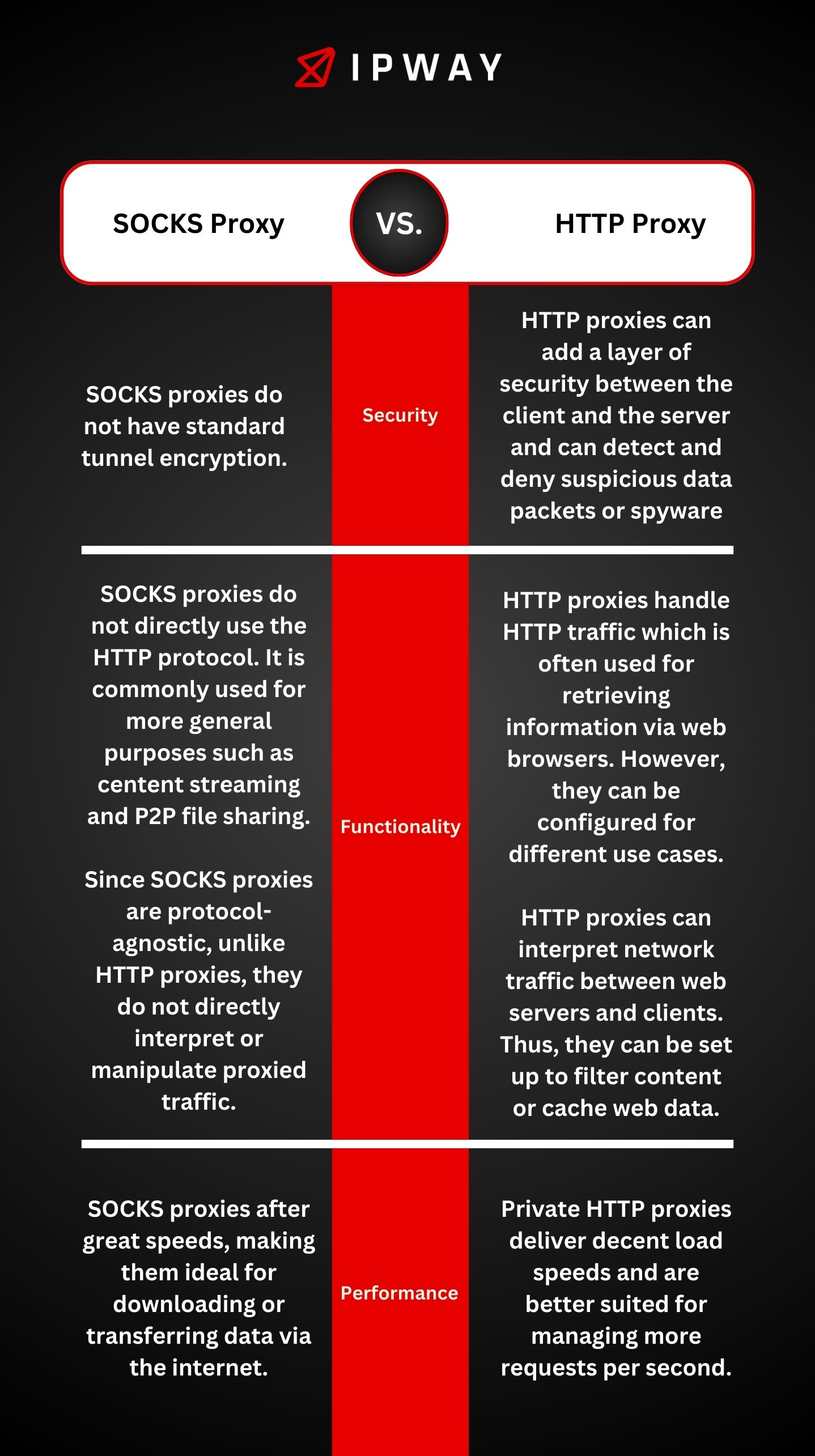In the realm of network security and privacy using proxies strategically plays a crucial role for both individuals and businesses. Among the proxy options available, SOCKS Proxy and HTTP Proxy stand out as key players, each with its unique features and uses.
This detailed piece thoroughly examines the aspects of these proxies providing a comprehensive comparison. By highlighting the distinctions, between SOCKS Proxy and HTTP Proxy, this guide helps users make well informed choices based on their specific needs and goals.
What is SOCKS Proxy?
SOCKS Proxy play a role in network communication setups acting as a flexible intermediary server that redirects internet traffic. Developed from the Socket Secure Rrotocol, these proxies create a bridge between your network and the internet enabling a secure and anonymous link. Unlike proxies that are restricted to certain protocols or applications, SOCKS proxies are versatile and can manage various types of data such as web browsing, emails, file transfers and even voice, over IP (VoIP) calls.
What are HTTP Proxies?
HTTP proxies however are tailored for traffic. They analyze, store and oversee information moving through the HTTP protocol. This specialization enables HTTP proxies to carry out tasks like storing web pages, filtering content and controlling access. HTTP proxies are perfect for tasks such, as web data extraction, bypassing content restrictions and bolstering security and privacy during internet browsing.
SOCKS4 vs SOCKS5 vs HTTP
Understanding the disparities, among SOCKS4, SOCKS5 and HTTP proxies entails grasping their core variances in protocol support, security attributes and real world uses. Every variation serves networking requirements providing diverse functionalities and security measures.

SOCKS4 Proxies
SOCKS4 proxies work on the session layer of the OSI model providing a way to route TCP connections through a middle server. One key aspect of SOCKS4 is its capacity to relay data between a user and a server without modifying the data itself. This characteristic makes SOCKS4 useful, in scenarios where the aim’s to circumvent internet restrictions or censorship without requiring complex security measures or authentication.
Key Characteristics of SOCKS4
Protocol Support: SOCKS4 only works with the TCP protocol, which’s great for stable connection oriented communication. However it does not have UDP support making it unsuitable for activities that require real time responsiveness such, as streaming and gaming.
Lack of Authentication: The absence of authentication, in SOCKS4 poses a security risk by allowing unauthorized individuals to access the proxy server.
Limited Addressing: SOCKS4 proxies only work with IPv4 addresses, which may pose challenges in settings that favor or require the use of IPv6 as they are not compatible, with IPv6 networks.
SOCKS5 Proxies
SOCKS5 is an advancement, from SOCKS4 bringing in improved functionalities to overcome the restrictions of its predecessor. It aims to enhance security and flexibility by accommodating network protocols and providing authentication mechanisms.
Enhancements in SOCKS5
Extended Protocol Support: SOCKS5 proxies are compatible with both TCP and UDP making them ideal for connection free tasks such, as DNS queries and VoIP services.
Authentication Support: SOCKS5 provides authentication choices to improve security by limiting proxy access solely to authorized users.
IPv6 Compatibility: Supporting both IPv4 and IPv6 SOCKS5 ensures compatibility with networks and prepares for the transition to IPv6, in the future.
Domain Name Resolution: Using SOCKS5 allows for DNS lookups on the proxy server, which helps protect privacy by hiding DNS queries and assists, in circumventing DNS based filters or censorship.
HTTP Proxies
HTTP proxies are proxies created for managing web traffic, for HTTP and HTTPS protocols. They are customized for web browsing and online applications offering capabilities that SOCKS proxies lack by default.
Distinctive Features of HTTP Proxies
Content Inspection and Modification: HTTP proxies have the ability to examine and modify HTTP traffic, which enables them to manage web content filtering, block requests and make adjustments for control, over web access and policy enforcement.
Caching: HTTP proxies store web data delivering frequently requested information instantly which helps decrease delays conserve bandwidth and improve the speed of browsing.
Advanced Security Features: Several HTTP proxies include SSL inspection, which involves decrypting and examining HTTPS traffic for security risks or compliance, with policies before re encrypting it.
Comparative Overview
Protocol Flexibility: SOCKS5 proxies provide extensive protocol support, including TCP and UDP as well as IPv6 in contrast, to SOCKS4 proxies which only support TCP and IPv4 and HTTP proxies that mainly handle HTTP/HTTPS traffic.
Security and Authentication: SOCKS5 proxies provide an added layer of security through authentication, which sets them apart from SOCKS4. On the hand HTTP proxies are known for their focus on web security and come equipped with features such, as SSL inspection.
Application Suitability: SOCKS proxies are known for their flexibility, in handling web protocols and direct connections whereas HTTP proxies are specifically optimized for internet traffic improving the browsing experience through caching and filtering content.
SOCKS5 proxy servers benefits
Enhanced Security with Authentification
One major advantage of SOCKS5 servers is their ability to support authentication mechanisms. Unlike SOCKS4, which does not need authentication SOCKS5 permits the server administrator to establish an authentication process guaranteeing that only approved users can connect to the proxy server.
This aspect plays a role in preventing unauthorized access and potential abuse of the proxy thus enhancing overall network security. The authentication process in SOCKS5 can be set up in ways, such as using basic username/password verification or more advanced methods offering flexibility, in managing security measures.
Improved Performance for Various Applications
SOCKS5 proxies are created to manage a range of internet protocols, such, as TCP (Transmission Control Protocol) and UDP (User Datagram Protocol) which SOCKS4 does not accommodate.
TCP Applications: SOCKS5 proxies utilize TCP to ensure the transmission of data, such, as when browsing the web or transferring files. This method guarantees that data packets are sent in order and acknowledged, thus preventing any loss or corruption of data.
UDP Applications: The UDP support of SOCKS5 boosts efficiency for applications by enabling rapid non sequential data transfer perfect, for streaming, gaming and voice/video calls where speed is crucial and slight data loss can be accepted.
Support for Both IPv4 and IPv6
The transition from IPv4 to IPv6 is ongoing. The fact that SOCKS5 supports both protocols makes it valuable in todays networks and those of the future. Its ability to work with stacks enables effortless internet connectivity, on different devices and applications making IPv6 resources more accessible and ensuring compatibility during the transition period.
Enhanced Privacy and Anonymity
Using SOCKS5 proxies helps boost your privacy and anonymity by hiding your IP address and directing DNS requests through the proxy. This shields your actions, from websites, internet service providers and potential eavesdroppers providing an extra level of confidentiality.
Reasons to use SOCKS and HTTP proxies
SOCKS and HTTP proxies are commonly utilized to enhance security, privacy, network efficiency and access management. They serve as intermediaries that offer advantages for various applications and requirements. Here’s an expanded view on the reasons to use SOCKS and HTTP proxies:
Reasons to Use SOCKS Proxy
Protocol Agnoticism and Flexibility: SOCKS Proxy is versatile as it can manage all TCP or UDP traffic regardless of the protocol making it useful for tasks such as sending emails transferring files via FTP, streaming content and engaging in VoIP calls. Its ability to support both protocols enhances efficiency and minimizes delays in activities, like streaming videos. Playing online games.
Enhanced Aninymity and Security: Using a SOCKS proxy to redirect traffic conceals the IP addresses of users, which boosts privacy. This is crucial, for individuals looking to safeguard their information and sensitive data. SOCKS5 proxies offer security by demanding authentication permitting only approved access.
Bypassing Geographical Restrictions and Firewalls: Using SOCKS Proxy can help people in areas, with internet restrictions or those looking for region services by bypassing censorship and geo blocks. By connecting through a proxy server in a location users can browse the web as if they were physically there.
Reasons to Use HTTP Proxies
Web Traffic Filtering and Monitoring: HTTP proxies play a role in overseeing and regulating web traffic for organizations. They help enforce usage guidelines protect against risks by blocking harmful websites and filter content to ensure a safe and productive online space. This management is essential, for upholding an smooth online experience.
Accelerating Web Access Through Caching: HTTP proxies store web data to make browsing faster and save data usage. They deliver saved pages instantly without having to fetch them from the server, which’s valuable, for networks that require quick internet access or want to conserve bandwidth.
Load Balancing for Improved Performance: HTTP proxies also serve as load balancers by distributing requests across servers to avoid overwhelming them and improve response times. This function is crucial, for ensuring that high traffic websites operate seamlessly and effectively.
Privacy and Anonymity Online: Similar to SOCKS proxies HTTP proxies improve anonymity by hiding users IP addresses assisting individuals who value privacy or want to maintain anonymity. Additionally they encrypt web requests to provide security, against potential data interception.
SOCKS Proxy vs HTTP Proxy: the main differences
Security
When considering security aspects SOCKS5 proxies provide protection as they support authentication and can securely manage various types of traffic. On the hand HTTP proxies offer security functionalities such as content filtering and monitoring which prove useful, for managing web traffic but are confined to handling HTTP/HTTPS traffic exclusively.
Functionality
When it comes to SOCKS proxies they are versatile. Can handle various types of traffic and protocols due to their design that works with any protocol. On the hand HTTP proxies are specialized in web traffic but come with extra features like caching and filtering making them great, for web based applications.
Performance
Different situations can affect how well things work; SOCKS5 proxies usually perform better for activities that need both TCP and UDP traffic like watching videos or playing games. On the hand HTTP proxies might be more effective, for browsing the web because they can store web content and make pages load faster.
Bottom Line
Choosing between SOCKS and HTTP proxies depends on what the user needs. SOCKS proxies are versatile and secure for online activities making them great, for general use especially when dealing with non HTTP data. On the hand HTTP proxies are designed for web related tasks like improving browsing experience, filtering content and scraping websites.
To make a informed choice it’s crucial to grasp the technical features, security risks and performance qualities of each type of proxy. Whether you’re considering SOCKS5 for its support across various applications or HTTP for its focus, on web related functions selecting the appropriate proxy type can greatly influence the effectiveness, safety and speed of your online endeavors.
